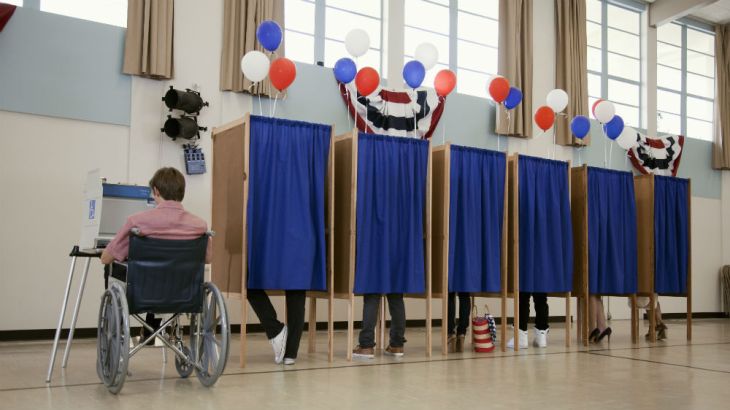US voters with disabilities find new voice
Activists started #CripTheVote campaign to unite community and get politicians’ attention.

A watershed moment in the 2016 race for the White House occurred nearly a year ago when Republican presidential candidate Donald Trump mocked a disabled New York Times reporter, Serge Kovaleski, thrashing his arms to mimic a physical impairment.
Voters expressed disgust, and Democtratic Party nominee Hillary Clinton’s campaign quickly capitalised with attack ads.
Keep reading
list of 4 itemsAt least nine dead after stage collapses at Mexico campaign rally
As Brazil copes with floods, officials face another scourge: Disinformation
Rishi Sunak calls UK general election for July 4
Above all, the incident mobilised American voters with disabilities, who, at one in six eligible voters, are the country’s largest minority.
“The disability community is an extremely diverse community for a number of reasons,” said Filippo Trevisan, deputy director of The Institute on Disability and Public Policy.
“It can be difficult sometimes to bring it all together under a common cause. Donald Trump’s comments against a disabled reporter may have galvanised this base.”
While Trump’s comments were a motivating force, Americans with disabilities have since sought to direct the election conversation towards issues affecting their community.
Disability rights advocates started the #CripTheVote campaign to use social media as a tool to elevate issues of importance to voters with disabilities to the political agenda.
Andrew Pulrang, one of the campaign’s founders, cites labour law exemptions that allow employers to pay less than the minimum wage to workers with disabilities as a policy issue where activists have made an impact.
More than 200,000 Americans with disabilities work for subminimum wages, according to the US Department of Labor.
A 1938 law allows employers to set wages based on how productive a person with disabilities is compared to a non-disabled worker doing the same task. The law sets no floor for wages, so many workers with disabilities earn as little as a dollar an hour.
“Both Hillary Clinton and Bernie Sanders have endorsed getting rid of the sub-minimum wage,” Pulrang told Al Jazeera’s The Stream . “It’s a very specific issue that got addressed at least at the campaign level.”
Disability issues
Lawrence Carter-Long, a spokesman for the National Council on Disability, said he would like to see disability included in a broader range of policy issues such as transportation, education and poverty.
“If you can’t get the job, if you’re finding it more difficult to get to the job, if you can’t get an education, if you’re eight times more likely to live in poverty than your non-disabled peers, those are all disability issues,” Carter-Long says.
Ballot access and voting rights are persistent problems for voters with disabilities seeking to make their voices heard in the election.
According to a report by the National Council on Disability on the 2012 election, one in five voters with a disability was kept from casting a ballot privately and independently ( PDF ). The report also found rampant problems with polling place accessibility and a lack of working technology to assist people with disabilities casting their vote.
Alec Frazier, director of the disability campaigning group Autistic Reality, said a common problem at polling places is poll workers’ limited understanding of what constitutes a disability.
“My biggest concern with voting accessibility is what happens when you don’t have a visible disability,” Frazier, who has autism, said. “I was told at one point that I did not need accessible voting because I am not visibly impaired.”
Voting rights revoked
People with intellectual disabilities frequently have their voting rights taken away entirely.
According to data from the Election Assistance Commission, more than 7,300 people in 33 states lost their voting rights due to “mental incompetence” between 2012 and 2014. Ten states ban those declared mentally incompetent from voting automatically.
Voting rights are often taken away when a person with an intellectual disability has a legal guardian appointed to oversee some of their decision-making and care.
Thomas Coleman, a disability rights attorney, has challenged this practice in California.
“I found through case after case that judges and attorneys … were stripping people of their voting rights,” Coleman said. “Just assuming that they lack the capacity to vote.”
Despite these barriers, Carter-Long sees the disability community continually gaining influence.
“You screw something up, and disabled people are going to take to Twitter and call you out on it. That’s never happened before,” he says, adding that today, US politicians at all levels are paying attention.
Pulrang says that he hopes non-disabled people will use this election as an opportunity to examine their own biases toward people with disabilities.
“Ableism is not just the most outrageous things people say, it’s also the less intense but deeply ingrained habits,” said Pulrang, who has a rare genetic condition affecting his joints and spine. Since his disability manifests itself visually, Pulrang says many able-bodied people will often subconsciously avoid addressing him directly in conversation.
“There’s a parallel there with politics. Politicians will talk about us – which is good progress – but not so much to us.”
“Disability used to be a diagnosis – now it’s a community,” says Carter-long. “It’s an identity and a constituency that politicians have to pay attention to.”